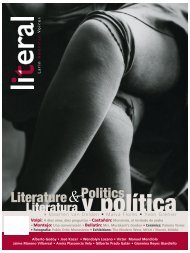Giobany Arévalo > Gabriela Torres Olivares >Anuar Jalife - Literal
Giobany Arévalo > Gabriela Torres Olivares >Anuar Jalife - Literal
Giobany Arévalo > Gabriela Torres Olivares >Anuar Jalife - Literal
You also want an ePaper? Increase the reach of your titles
YUMPU automatically turns print PDFs into web optimized ePapers that Google loves.
LIBROS BOOKS CD RECORDS<br />
IMAGINARY EXTREMIST<br />
Rogelio García-Contreras<br />
Maps of concentration camps superimposed<br />
on a Map of Colonia Renacer–Rebirth Colony–or<br />
any other city in the Americas, from<br />
Valparaiso to Concepcion, or just situated in<br />
a rural empty space, as empty as the never<br />
ending Pampas. A vivid reference to Harry<br />
Sibelius’s detailed description of the political<br />
structure of Hitler’s America, in spite of–<br />
or precisely because of–his fascination with<br />
Russian Literature. The family clan behind the<br />
publication of a magazine called The Fourth<br />
Reich in Argentina and later the creation of<br />
a publishing house under the same name.<br />
The revelation before our eyes of advocates<br />
for the re-establishment of the Inquisition,<br />
corporal punishment in public, a permanent<br />
war against the Chileans, the Paraguayans<br />
or the Bolivians as a kind of gymnastics for<br />
the Argentinean nation; polygamy or the extermination<br />
of the Indians to prevent further<br />
contamination of the Argentinean race. And<br />
also in this book the reference to J.M.S. Hill’s<br />
Homenaje al maestro © Florinda Power<br />
Roberto Bolaño<br />
Nazi Literature in the<br />
Americas,<br />
New Directions,<br />
New York, 2008.<br />
Translated<br />
by Chris Andrews<br />
fi rst novel describing one of Quantrill’s Raiders<br />
crossing the state of Kansas at the head<br />
of 500 cavalrymen; fl ags inscribed with a sort<br />
of primitive, premonitory swastika; rebels<br />
who never surrender; a Confederate philosopher<br />
whose fanciful dream was to establish<br />
an ideal Republic in the vicinity of the Artic<br />
circle.<br />
Whether through the recompilation of<br />
fantastic stories or the elegant and poetic<br />
presentation of short biographies of imaginary<br />
authors, Roberto Bolaño offers a twisted<br />
and intelligent account of the Nazi and Neo-<br />
Nazi presence in the Americas. The introduction<br />
to a family of publishers, whose love for<br />
Hitler started after their fi rst encounter with<br />
the fuhrer; the reference of a bunch of poets<br />
born in the Americas but nurtured by fascist<br />
Europe either through their direct experience<br />
or their own idealize version of the beloved<br />
continent; his admiration for speculative and<br />
science fi ction, or his view of virulent mercenaries,<br />
magicians or miserable creatures; a<br />
parade of monsters, as he ended up calling<br />
them. The book, I must say, is a wonderful<br />
literary piece. Through the eyes, ideas and<br />
actions of his set of imaginary extremists,<br />
Bolaño does not only provide an encyclopedic<br />
account of intense right-wing writers–as<br />
the back page of this edition warns us–but it<br />
reveals the human side of the beholders of<br />
this position, their beauty, their certainty, and<br />
even more drastically, their genuineness and<br />
conviction.<br />
Bolaño’s creativity and imagination has<br />
no limits and Nazi Literature in the Americas<br />
is vivid proof of this statement. Right wing<br />
52 LITERAL. LATIN AMERICAN VOICES FALL, 2009<br />
extremist writer, Harry Sibelius has read Arnold<br />
J. Toynbee’s Hitler’s Europe. Sibelius is<br />
fascinated by the work of the English historian<br />
so much, that he decides to base his own<br />
novel “The True Son of Job” on the book of<br />
his new literary hero. In fact, the fi rst part of<br />
Toynbee’s work entitled “The Political Structure<br />
of Hitler’s Europe” becomes, in Sibelius’s<br />
“The Political Structure of Hitler’s America”.<br />
Nothing is hidden then, and Sibelius decides<br />
to start a novel with a powerful and disturbing<br />
supposition: Nazi Germany has won the<br />
war; but what difference does it make? Bolano<br />
asks, this is just a novel and as we all<br />
know novels are not a work of history, right?<br />
But what if, like Carlos Fuentes would suggest,<br />
novels are the reliable cousins of history?<br />
What if Sibelius is right: “the historian’s<br />
view is conditioned, always and everywhere,<br />
by his own location in time and place; and,<br />
since time and place are continually changing,<br />
no history, in the subjective sense of the<br />
word, can ever be a permanent record that<br />
will tell the story, once for all, in a form that<br />
will be equally acceptable to readers in all<br />
ages”. And it is here, probably, that Bolanos’s<br />
work abandons the safe realm of fi ction to<br />
penetrate into the obscure, overwhelmingly<br />
rouge and frankly depressive realities of Aryan<br />
brotherhoods, of the American Christian<br />
Movement, of the pathetic Haitian writer excited<br />
by the idea of being a Nazi poet while<br />
continuing to espouse a certain kind of negritude.<br />
Despite its monstrosity, Bolaño reminds<br />
us that reality transcends fi ction, that his story<br />
is not that fantastic and that history–or at<br />
least what we know about it–is by no means<br />
an attempt to understand the past, but an<br />
effort to justify the present. Only a writer<br />
with such a postmodern view of our civilization<br />
and all its shortcomings can describe<br />
with so much precision, cynicism and humor<br />
the novel written by Segundo Jose Heredia,<br />
the impetuous Venezuelan, who wrote in<br />
Saturnalia about the violence of rape scenes,<br />
sexual and workplace sadism, incest, impaling,<br />
and human sacrifi ce in prisons crowded<br />
to the physical impair. Foucault’s genealogy<br />
of history cannot be explained any better,<br />
and I imagine Dostoyevsky would be praising<br />
Schiaffi no as much as Borges would be<br />
praising Bolaño.






